In developing this Glossary, the ESMO Translational Research and Personalised Medicine Working Group (TR and PM) considered a review of a previous ESMO document, the Glossary in Molecular Biology of Cancer, as a priority. The first edition was produced more than a decade ago on the occasion of an ESMO educational course. The aim was to enhance the understanding of attendees in a difficult area for most clinicians. In the meantime, the field of cancer biology has become increasingly important and new complex terms and knowledge have emerged, as well as molecular techniques in oncology.
Therefore, the members of the ESMO TR and PM have revised the textual content of the previous Glossary, basically the definitions of terms ordered from A to Z. During the revision process, the question of having more incentives from such a publication was raised, and the idea of adding images illustrative of the terms was born. Images for certain terms have been selected with permission from the respective journals where they were initially published. In addition, TR and PM members wished to see incentives beyond classical reading and suggested accompanying each selected term by an image consisting of two panes, one of the structure of the gene, and the second of its network. The same logic was used for description of molecular techniques in cancer research.

Chair
Prof. Giampaolo Tortora, MD, PhD
Institute: Medical Oncology Unit and Medical School, University Hospital Verona, Verona, Italy
Giampaolo Tortora is currently Professor of Medical Oncology and Director of the Medical Oncology Unit at the Medical School and the University Hospital of the University of Verona, Italy. He is also Director of the Specialty School and Residency Program in Medical Oncology.
Prof. Tortora obtained an MD degree (Summa cum Laude), the Specialty in Oncology (Summa cum Laude), and a PhD in Molecular Biology and Pathology at the University of Napoli “Federico II”.
He received research training for almost five years at the National Cancer Institute, Bethesda, MD, USA and visited for short sabbaticals several academic and research institutions in Europe and the USA.
Prof. Tortora’s main research areas are: the study of tyrosine kinase receptors, angiogenic factors, and the microenvironment as targets for cancer therapy; development of novel targeted agents and therapeutic strategies integrating targeted agents and chemoradiotherapy from the preclinical to clinical setting; and analysis of biomarkers.
Prof. Tortora is the author of over 140 publications in international journals with impact factors, the great majority as senior author, including the New England Journal of Medicine, Journal of the National Cancer Institute, PNAS, Journal of Clinical Oncology, and Clinical Cancer Research (total impact factor over 900 and h-index 49).
He has received several awards and grants for his studies on novel anti-cancer targeted agents.
He is a member of scientific boards and committees of several national and international research societies and organisations and is Associate Editor/board member of several scientific journals in the field of oncology. He is an Associate Editor of Annals of Oncology and Chair of the Translational Research Working Group of ESMO.
Prof. Tortora teaches Medical Oncology at residential courses for MD students, Residents in Oncology, and PhD students.
He routinely lectures at national and international academic and research institutions.
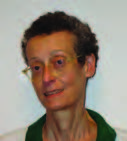
Co-chair
Prof. Cristiana Sessa, MD, PhD
Institute: Oncology Institute of Southern Switzerland (IOSI), Bellinzona, Switzerland
Professor Cristiana Sessa graduated in Medicine and Surgery at the University of Milan in 1978, followed by a Degree in Pharmacology at the Mario Negri Institute of Milan in 1981, Specialisation in Obstetrics and Gynaecology at the University of Verona in 1983, Diploma in Palliative Medicine at the College of Medicine of the University of Wales in 1991 and a Masters degree in Economics and Health Management at the University of Lugano in 2002. Since 2009, Cristiana Sessa has been Professor at the University of Bern (Switzerland).
Prof. Tortora obtained an MD degree (Summa cum Laude), the Specialty in Oncology (Summa cum Laude), and a PhD in Molecular Biology and Pathology at the University of Napoli “Federico II”.
He received research training for almost five years at the National Cancer Institute, Bethesda, MD, USA and visited for short sabbaticals several academic and research institutions in Europe and the USA.
Prof. Cristiana Sessa has been working at the Oncology Institute of Southern Switzerland, Ospedale San Giovanni, Bellinzona since 1981, she has been appointed as Head of Phase I-II Unit and Pharmacology and she is currently Vice Head of Medical Oncology and Head of Clinical Research. She has been the Bellinzona Site Director of the Clinical Trial Unit of the Ente Ospedaliero Cantonale (CTU-EOC) since 2012.
Cristiana Sessa is a Member of the European Society for Medical Oncology (ESMO), where she is a committee member of the ESMO Guidelines Working Group and of the Translational Research Working Group.
She is also President of the Swiss Group for Clinical Cancer Research (SAKK) New Anticancer Drugs project group and of the working group on Gynaecological Tumours.
Prof. Cristiana Sessa was appointed to the Executive Board of the European Society of Gynaecological Oncology (ESGO) in 2013.

Members
Prof. Lothar Bergmann, MD, PhD
Institute: Department of Internal Medicine II, J.W. Goethe University Frankfurt, Frankfurt, Germany
Prof. Lothar Bergmann graduated in medicine at the J.W. Goethe University Frankfurt in 1976. He was trained in internal medicine and in 1988 admitted as a specialist in haematology and medical oncology. From 1987 he acted as Assistant Medical Director of the Department of Internal Medicine III at the University in Frankfurt. From 1997 to 1999 he served as a Provisional Professor and Medical Director at the Department of Internal Medicine at the University in Ulm, and until 2007 as a Provisional Professor and Medical Director at the Department of Internal Medicine II at the J.W. Goethe University in Frankfurt. Since August 2007, he has served at the same department as Deputy Medical Director.
Prof. Bergmann is a Chair of the Cancer Center Rhein-Main e.V. and chairs the Haematology/Oncology section of the University Cancer Centre (UCT) Frankfurt. In addition, he is a permanent member of the Scientific Advisory Group Oncology (SAG - Oncology) of the European Medicines Agency. Prof. Bergmann chairs the Interdisciplinary Study Group for Renal Cell Cancer of the German Cancer Society (DKG). He serves as a reviewer for various national and international medical journals.
Prof. Bergmann is a member of many international societies such as the American Society of Clinical Oncology (ASCO), the American Association for Cancer Research (AACR), the European Society for Medical Oncology (ESMO), the European Hematology Association (EHA), the International Society for Experimental Hematology (ISEH), and the American Society of Hematology (ASH). Additionally, he is a member of various German societies including the German Society of Haematology and Oncology (DGHO), the German Cancer Society (DKG), the Study Group for Medical Oncology (AIO), and the German Society of Internal Medicine.
Clinically he focuses on the therapies of lymphomas and chronic lymphatic leukaemias and various solid tumours as well. Scientifically he deals with tumour-suppressor genes and oncogene regulation, apoptosis in cancer cells, and immune regulation, in which the blocking of signal transduction via gene silencing and targeted agents plays a major role.

Maja Bradic Lindh, MD, PhD
Institute: Cancer Centre Karolinska, Stockholm, Sweden
Dr Maja Bradic Lindh obtained a Medical Doctor degree at the Medical School, University of Novi Sad, Serbia. She worked for five years as a general practitioner and had five years’ working experience as a clinician at the Medical Oncology Department of the Oncology Institute of Vojvodina. She mostly worked with breast cancer patients.
She has been an active member of the Young Oncologists Committee and active member of the Translational Research Working Group of the European Society for Medical Oncology for four years.
She undertook her PhD studies in cancer research at the Cancer Centre Karolinska, Stockholm, Sweden and defended her thesis in April 2011 with the title: “Mechanisms determining efficacy of tyrosine kinase-targeting anti-cancer drugs”.
Dr Bradic Lindh’s most significant publications are in the area of identification of a SOX2-dependent subset of tumour- and sphere-forming glioblastoma cells with a distinct tyrosine kinase inhibitor sensitivity profile.
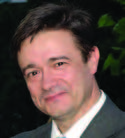
Prof. Andrés Cervantes-Ruiperez, MD, PhD
Institute: Department of Hematology and Medical Oncology, University Hospital, Valencia, Spain
Prof. Cervantes trained as a medical oncologist at the University Hospital in Valencia. After this period, he worked as a research fellow at the Free University Hospital in Amsterdam under the direction of Prof. H.M. Pinedo in a project on multidrug resistance. He gained his PhD degree on this topic.
Prof. Cervantes was appointed as a full-time cancer specialist at the University Hospital, Valencia in 1998 and was primarily involved in gastrointestinal and ovarian cancer management. He became Associate Professor of Medicine and Medical Oncology at the University of Valencia in 1992. Prof. Cervantes was appointed head of section and responsible for the early drug development programme (phase I) at the same institution in 2004. He has led the Cancer Research Group at the Institute of Health Research INCLIVA since 2009. His main area of research is early clinical trials with pharmacodynamic end points and molecular determinants of sensitivity to targeted anti-cancer agents.
Prof. Cervantes has been a member of the ESMO executive board since 2011, chairs the Guidelines Working Group at ESMO, and served as an Educational Committee member since 2002. In 2010 he served as the Educational Chair of the ESMO Congress in Milan. He is editor in chief of Clinical and Translational Oncology and editorial board member of Cancer Treatment Reviews. He has contributed to over 170 peer-reviewed publications, including publications in the New England Journal of Medicine, Journal of the National Cancer Institute, Journal of Clinical Oncology, Annals of Oncology, European Journal of Cancer, Cancer, Cancer Research, and Clinical Cancer Research.
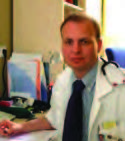
Rafal Dziadziuszko, MD
Institute: Department of Oncology and Radiotherapy, Medical University of Gdansk, Gdansk, Poland
Dr Rafal Dziadziuszko completed his training in Radiotherapy (2001) and Medical Oncology (2004) at the Department of Oncology and Radiotherapy of the Medical University of Gdansk, Poland.
He subsequently completed a translational cancer research fellowship at the University of Colorado Cancer Center. Between 2005 and 2007 he worked on predictive assays for EGFR targeted therapies in lung cancer, including immunohistochemistry, gene copy number, and activating mutations. He then returned to his home institution to serve as a deputy chair of the department.
Dr Dziadziuszko’s main interests include lung cancer translational and clinical research methodology, and he is a coauthor of several peer-reviewed articles and book chapters on this topic. He is a member of the European Organisation for Research and Treatment of Cancer – Lung Cancer and Radiotherapy Groups, European Society for Medical Oncology, American Society of Clinical Oncology, and American Association for Cancer Research. He has also participated in the organisation of several academic clinical research studies in Poland and Central Europe through the Polish Lung Cancer Group and serves as the Vice-Chairman of the Central and East European Oncology Group.
His current work includes the identification of novel targets for lung cancer trials and early lung cancer detection. He has been involved in IGF-1R, ALK, and MET translational and clinical research.
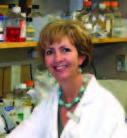
Prof. S. Gail Eckhardt, MD, PhD
Institute: School of Medicine, Division of Medical Oncology, University of Colorado Anschutz Medical Campus, Aurora, CO, USA
S. Gail Eckhardt, MD is a tenured Professor and Head of the Division of Medical Oncology at the University of Colorado at Denver and Health Sciences Center, where she also holds the Stapp/Harlow Endowed Chair for Cancer Research and is the Senior Associate Director for Translational and Collaborative Research at the University of Colorado Comprehensive Cancer Center.
Dr Eckhardt is a member of ESMO and has served on the Translational Research Working Group since 2009. Dr Eckhardt has also served on numerous committees/study sections, including the ASCO Molecular Oncology Task Force, the ASCO Board of Directors, the FDA Oncology Drugs Advisory Committee, the NCI Developmental Therapeutics Study Section, and the NCI Cancer Centers Study Section. She is also a member of the NCI Colon Cancer Task Force. In addition, Dr Eckhardt has been an Associate Editor of Clinical Cancer Research, Journal of Clinical Oncology, and Investigational New Drugs.
Dr Eckhardt is the Principal Investigator on grants involving early clinical trials and colorectal cancer research and has conducted numerous phase I and II clinical trials. She has published over 135 manuscripts and serves on numerous advisory boards. Her area of interest is in the preclinical and clinical development of combinations of molecularly targeted compounds, with a laboratory focus on colorectal cancer and melanoma.
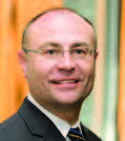
Prof. Heinz-Josef Lenz, MD, FACP
Institute: Division of Medical Oncology, University of Southern California, Norris Comprehensive Cancer Center, Los Angeles, CA, USA
Heinz-Josef Lenz is Professor of Medicine and Professor of Preventive Medicine, holds the Kathryn Balakrishnan Chair for Cancer Research, is Associate Director, Clinical Research, Co-Chair of GI Oncology, Co-Director USC Center for Molecular Pathways and Drug Discover at the University of Southern California Keck School of Medicine and USC/Norris Comprehensive Cancer Center in Los Angeles, California.
Dr Lenz received his medical degree from Johannes-Gutenberg Universität in Mainz, Germany, and went on to complete a residency in haematology and oncology at the Eberhard-Karls Universität Tübingen, Germany before completing clerkships in oncology and haematology at George Washington University and the Beth Israel Hospital of Harvard Medical School, respectively. He completed a postdoctoral fellowship in the Department of Biochemistry and Molecular Biology at the USC Keck School of Medicine.
Dr Lenz’s research focus is in the identification of biomarkers in GI cancers, early drug development, and novel clinical trials. He is Co-Chair of the SWOG GI Committee, Co-Chair of SWOG GI Translational Medicine, and member of the NCI GI Steering Committee and NCI Gastroesophageal Task Force and NCI Correlative Science Committee. He is the USC Principal Investigator for NIH U01, N01, and U10.

Nicola Normanno, MD
Institute: Cell Biology and Biotherapy Unit, Istituto Nazionale Tumori di Napoli–Fondazione Pascale, Naples, Italy
Dr Normanno is a medical oncologist but he is mainly involved in preclinical research and in molecular diagnostics. His research interest is focused on the study of the mechanism of action of target-based agents with particular regard to anti-EGFR drugs, and on the identification of biomarkers that are associated with sensitivity or resistance to these agents. He is actively involved in several clinical trials in which his laboratory is assessing the correlation between expression of tissue and serum biomarkers and the activity of treatments with novel drugs or novel drug combinations. He is also involved in the organisation of national and European external quality assessment (EQA) schemes in molecular diagnostics. In particular, he is collaborating with the European EQA programme for EGFR testing.

Desamparados Roda Perez, MD
Institute: Department of Medical Oncology, University Hospital, Valencia, Spain
Desamparados Roda Perez’s career in translational oncology has been associated mainly with her work in the Phase I Trials Unit and in collaboration in the development of new drugs, especially during the last year, during the beginning of her formative period in basic research.
Her training in clinical research is aimed at conducting phase I clinical trials in the Phase I Cancer Unit within the Department of Haematology and Medical Oncology directed by Prof. Andrés Cervantes. In January 2009, she joined the First in Human Unit and since then she has participated actively in all phases of the biologically most relevant questions in phase I studies: individualised therapy for each patient according to molecular selection; biomarkers identification and study of each pathway; and pharmacodynamic and pharmacokinetic analysis for each new drug.
She has contributed to the development of phase I and II trials with novel therapeutic inhibitors of key signalling pathways deregulated in cancer, including the IGFR/PI3K/AKT pathway and the MAP kinase pathway. In addition the group is working to develop treatments to overcome resistance to anti-EGFR therapies.
In January 2011, she received a Río-Hortega grant awarded by the Carlos III Health Institute. This is a three-year grant for training in basic and clinical research. Her training in cellular and molecular biology is carried out in the laboratory of Prof. Juan R. Viña at the Department of Biochemistry and Molecular Biology, Faculty of Medicine, University of Valencia, where she is involved in a project on colorectal cancer cell lines concerning resistance to anti-EGFR therapies mediated by K-Ras oncogene mutation.
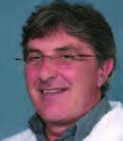
Prof. Aldo Scarpa, MD, PhD
Institute: ARC-NET Research Centre for Applied Research on Cancer, Department of Pathology and Diagnostics, University and Hospital Trust of Verona, Verona, Italy
Aldo Scarpa is the Director of the ARC-NET Research Centre for Applied Research on Cancer and Chair of the Department of Pathology and Diagnostics at the University and Hospital Trust of Verona.
Prof. Scarpa received his MD from the University of Padua and his PhD in Human Oncology and Molecular Pathology from the University of Verona. He trained in Japan at the National Cancer Center of Tokyo, at the New York University and La Jolla Cancer Research Center, USA, and at the Nürnberg Universität, Germany. His main research interests are: molecular genetics of tumours; validation, quality control and automation in molecular diagnostics; and molecular and cellular biology of pancreatic tumours.
His work has been published in over 250 peer-reviewed publications. Prof. Scarpa has also participated in the creation of facilities addressing cancer research needs such as biobanks (creation/standardisation of processes for cancer/normal biological materials and data sets), cancer models (creation of primary human cancer xenografting facility), and molecular diagnostics (development, standardisation, and automation).
Prof. Scarpa was instrumental in the foundation in the early 2000s of the Laboratory of Molecular Diagnostics at the Cancer Center in Cuenca, Ecuador, fully implemented through the participation of local staff including the ability to write projects to raise funds. He received the honorary citizenship of Cuenca, Ecuador.
Prof. Scarpa’s recent achievements include the design, financing, and development of a research centre for the identification and clinical validation of diagnostic/prognostic markers and therapeutic targets in oncology (ARC-NET). He is also responsible for the Italian initiative within the International Cancer Genome Consortium (ICGC) sequencing rare pancreatic tumours and collaborates with Australia on pancreatic ductal carcinoma.
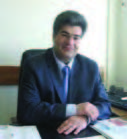
Prof. Konstantinos Syrigos, MD, PhD
Institute: Oncology Unit, 3rd Department of Medicine, Athens University School of Medicine, Athens, Greece
Professor Kostas Syrigos graduated from Athens School of Medicine in 1988. He was trained in Internal Medicine at the Laikon University Hospital (Athens University) and in Medical Oncology at the Hammersmith Hospital (London University).
He completed his MD thesis with distinction from the Athens School of Medicine in 1995 and his PhD thesis from the Imperial College of Science, Technology and Medicine, London University in 2000. He worked as Senior Registrar in Medical Oncology at the Hammersmith and St Bartholomew’s Hospitals in London and as Consultant at the Sotiria General Hospital in Athens.
In 2002 he was appointed Associate Professor of Oncology in Medicine and Head of the Sotiria Oncology Unit. From 2006 he has also been Visiting Professor of Thoracic Oncology at Yale University, CT, USA. His main fields of interest are targeted therapies, drug development, as well as thoracic and head & neck oncology.
Professor Syrigos has participated in several international phase I–IV clinical trials in lung, colon, head & neck, and pancreatic cancer. His research interests include neoangiogenesis and the role of adhesion molecules in the neovasculature.
He has published several papers on the role of the E-cadherin–catenin pathway in the pathogenesis, prognosis, and prediction of neoplastic diseases. He has also conducted early phase (I–II) clinical trials with agents targeting this pathway. He is a member of numerous scientific societies. He is a manuscript reviewer for 18 scientific journals and currently serves on the editorial board of 5 scientific journals. He is the editor of 6 International Scientific Volumes, including Tumors of The Chest (2006, Springer). He has contributed 80 chapters in international books and he is the author of 230 peer-reviewed, international articles.

Josep Tabernero, MD
Institute: Medical Oncology Department, Vall d’Hebron University Hospital, Barcelona, Spain
Josep Tabernero is currently the Head of the Medical Oncology Department at the Vall d’Hebron University Hospital in Barcelona, Spain and Head of the Gastrointestinal Tumours and Phase I Unit. He is actively involved in translational research and pharmacodynamic phase I studies with molecular-targeted therapies and related translational research, with a special focus on EGFR-family inhibitors and IGFR-PI3K-Akt-mTOR pathway inhibitors, and phase II and III studies with new chemotherapy agents in gastrointestinal tumours.
Dr Tabernero received his medical degree from the Universitat Autònoma de Barcelona and completed his specialist training in medical oncology. He is a member of the European Society for Medical Oncology (ESMO) and the American Society of Clinical Oncology (ASCO), and different editorial boards including the Journal of Clinical Oncology, Clinical Cancer Research, Cancer Discovery, Clinical Colorectal Cancer, and Annals of Oncology. He has (co)authored approximately 180 peer-reviewed papers. He has also been a member of the Educational and Scientific Committees of ESMO, ECCO, ASCO Gastrointestinal, and WCGIC meetings.
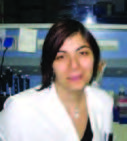
Teresa Troiani, MD
Institute: Università degli Studi di Napoli Federico II, Naples, Italy
Dr Troiani is a young oncologist, highly motivated, and clearly committed to clinical and translational research and an academic career. In fact, after completing her medical school studies, she was awarded a Fellowship in Oncology at the “Università degli Studi di Napoli Federico II”. She decided to join the laboratory of Prof. Ciardiello and Prof. Tortora. Dr Troiani has worked in their laboratory since 1998, studying the role of growth factors and their receptors in neoplastic transformation and the novel therapeutic strategies targeting growth factor receptor signalling.
Her long-term interest is translational oncology, developing new therapeutic strategies and initiating clinical trials. Therefore, Dr Troiani decided to join Dr Gail Eckhardt’s group and train in this area. She worked with Dr Eckhardt for two years and together they published several papers in international journals. After that experience, Dr Troiani moved back to Naples, where she has continued to work with Prof. Ciardiello at the Second University of Naples.
She has run a series of translational research projects, with both clinical and basic science investigational arms, at an academic medical centre. During her career, she has learnt that to fight cancer is a big challenge and only by connecting the preclinical with the clinical work is it possible to make one piece of the wider puzzle.
Lothar Bergmann: Nothing to declare.
Maja Bradic Lindh: Nothing to declare.
Andrés Cervantes-Ruiperez: A member of the speakers’ bureau for Merck Serono and Roche. Conducting research sponsored by Roche.
Rafal Dziadziuszko: Honoraria for presentations from Roche, Pfizer, and Boehringer Ingelheim.
S. Gail Eckhardt: Research funding from Pfizer, Genentech, Millennium/Takeda, and AstraZeneca. Consultant to Genentech, Sanofi-Aventis, and Millennium/Takeda.
Heinz-Josef Lenz: Grant support from NCI/NIH, CTEP, and SWOG. Consultant to Response Genetics, Genentech, Merck KG, Novartis, and BMS. Stock ownership in Response Genetics. Contracted research for BMS, Novartis, Roche, Sanofi-Aventis, Pfizer, NCI, CTEP, Merck, and Eli Lilly. Clinical trial support from Roche, Bristol-Myers Squibb, Eli Lilly, Sanofi-Aventis, Novartis, Genetech, Pfizer, and GSK. Honoraria from Response Genetics, Genentech, Merck KG, and BMS.
Nicola Normanno: Nothing to declare.
Desamparados Roda Perez: Nothing to declare.
Aldo Scarpa: Conducting research for Novartis and GSK.
Cristiana Sessa: Nothing to declare.
Konstantinos Syrigos: Conducting research for Eli Lilly, Merck Serono, Amgen, and Roche.
Josep Tabernero: Advisory role for Amgen, Genentech, Sanofi, Roche, and Celgene.
Giampaolo Tortora:Consultant for GSK, Novartis, Roche, and Pfizer.
Teresa Troiani: Nothing to declare.